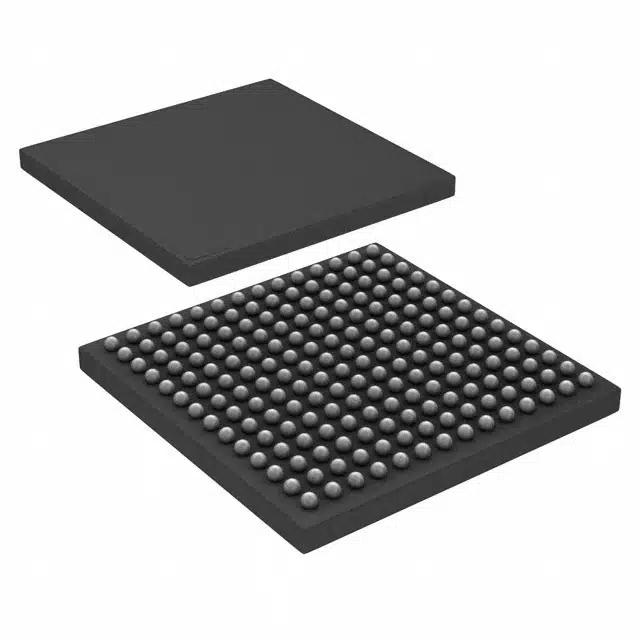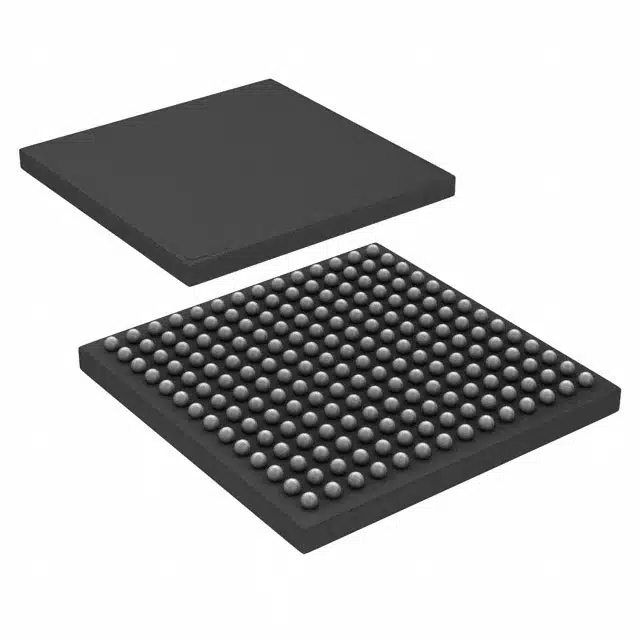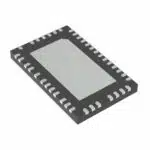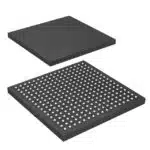
The MC-10105F1-821-FNA-M1-A microcontroller stands as a pivotal innovation in the automotive industry. Its advanced TPS-1 core ensures seamless handling of PROFINET I/O devices, making it indispensable for modern automotive networking. Designed with energy efficiency in mind, it operates within a supply voltage range of 0.9V to 3.6V, reducing power consumption in critical systems. Its robust performance in extreme temperatures, from -40°C to 85°C, highlights its reliability in demanding environments. By integrating cutting-edge technology with compact design, this microcontroller has the potential to redefine automotive systems and drive the industry toward unprecedented advancements.
Key Takeaways
-
The MC-10105F1-821-FNA-M1-A microcontroller features a TPS-1 core, enabling efficient handling of PROFINET I/O devices, which is crucial for modern automotive networking.
-
With a wide operating temperature range of -40°C to 85°C, this microcontroller ensures reliable performance in extreme automotive environments, making it ideal for critical applications.
-
Its compact 196-pin FPBGA design allows for integration into space-constrained automotive systems, supporting the development of lightweight and efficient vehicles.
-
Operating within a supply voltage range of 0.9V to 3.6V, the microcontroller minimizes power consumption, enhancing battery life in electric vehicles and improving fuel efficiency in traditional engines.
-
The MC-10105F1-821-FNA-M1-A excels in real-time processing, making it essential for Advanced Driver-Assistance Systems (ADAS) that require quick decision-making for safety-critical functions.
-
Its compatibility with hybrid and electric vehicle systems positions it as a versatile solution for managing energy recovery and battery monitoring, supporting the shift towards sustainable automotive technologies.
-
By integrating seamlessly with automotive sensors and cameras, this microcontroller enhances the functionality of ADAS, enabling features like collision avoidance and pedestrian detection.
Technical Overview of the MC-10105F1-821-FNA-M1-A
Core Specifications
TPS-1 core for PROFINET I/O device handling.
The MC-10105F1-821-FNA-M1-A incorporates the TPS-1 core, a specialized component designed to manage PROFINET I/O devices with precision. This core ensures seamless communication between automotive systems and industrial-grade networking protocols. By optimizing data exchange, it enhances the efficiency of real-time operations in vehicles. The TPS-1 core’s architecture prioritizes reliability, making it a critical feature for automotive applications that demand consistent performance.
32-bit data bus and 43 I/O lines for efficient processing.
This microcontroller features a 32-bit data bus, which significantly boosts its data-handling capacity. The wide data bus allows for faster and more efficient processing of complex automotive tasks. Additionally, the inclusion of 43 I/O lines provides flexibility for integrating multiple peripherals. These I/O lines enable the microcontroller to manage diverse automotive functions, from sensor inputs to actuator controls, ensuring smooth operation across various subsystems.
Automotive-Specific Features
Wide operating temperature range (-40°C to 85°C).
The MC-10105F1-821-FNA-M1-A demonstrates exceptional durability with its ability to operate within a temperature range of -40°C to 85°C. This feature ensures reliable performance in extreme automotive environments, such as freezing winters or scorching summers. Its resilience under such conditions makes it suitable for critical applications, including engine control and advanced driver-assistance systems.
Compact 196-pin FPBGA design for space-constrained environments.
The microcontroller’s compact 196-pin FPBGA package addresses the space limitations often encountered in modern automotive designs. This form factor allows engineers to integrate the device into tight spaces without compromising functionality. Its small footprint supports the development of lightweight and streamlined automotive systems, which are essential for improving vehicle efficiency and performance.
Low power consumption with a supply voltage range of 0.9V to 3.6V.
Energy efficiency remains a cornerstone of the MC-10105F1-821-FNA-M1-A’s design. Operating within a supply voltage range of 0.9V to 3.6V, this microcontroller minimizes power consumption while maintaining high performance. This characteristic proves invaluable for automotive systems, where reducing energy usage directly contributes to extended battery life in electric vehicles and improved fuel efficiency in traditional engines.
Automotive Applications of the MC-10105F1-821-FNA-M1-A
Advanced Driver-Assistance Systems (ADAS)
Real-time data processing for safety-critical functions.
The MC-10105F1-821-FNA-M1-A microcontroller plays a pivotal role in enhancing the functionality of Advanced Driver-Assistance Systems (ADAS). By processing real-time data from multiple sensors, it ensures rapid decision-making for safety-critical operations. This capability is essential for features such as collision avoidance, lane-keeping assistance, and adaptive cruise control. The microcontroller’s TPS-1 core enables seamless communication between automotive systems, ensuring that ADAS functions operate with precision and reliability. Its ability to handle complex computations in real time makes it indispensable for modern vehicles prioritizing safety.
Integration with automotive sensors and cameras.
The integration of the MC-10105F1-821-FNA-M1-A with automotive sensors and cameras elevates the performance of ADAS. It processes inputs from radar, LiDAR, ultrasonic sensors, and high-resolution cameras to create a comprehensive understanding of the vehicle’s surroundings. This microcontroller’s 32-bit data bus and 43 I/O lines allow it to manage these diverse inputs efficiently. By enabling accurate sensor fusion, it supports advanced features like pedestrian detection and traffic sign recognition. This integration ensures that vehicles equipped with ADAS can respond effectively to dynamic driving conditions.
Engine Control Units (ECUs)
Precision control for fuel efficiency and emissions reduction.
The MC-10105F1-821-FNA-M1-A excels in Engine Control Units (ECUs) by providing precise control over engine parameters. Its real-time processing capabilities optimize fuel injection, ignition timing, and air-fuel mixture, resulting in improved fuel efficiency and reduced emissions. This microcontroller’s low power consumption further enhances its suitability for ECUs, as it minimizes energy usage without compromising performance. By supporting stringent emission standards, it contributes to the development of environmentally friendly vehicles.
Compatibility with hybrid and electric vehicle systems.
The compatibility of the MC-10105F1-821-FNA-M1-A with hybrid and electric vehicle systems underscores its versatility. It manages critical functions such as battery monitoring, energy recovery, and motor control with high efficiency. Its wide operating temperature range ensures reliable performance in the demanding environments of electric and hybrid vehicles. As the automotive industry shifts toward sustainable technologies, this microcontroller provides the necessary support for innovative powertrain solutions.
In-Vehicle Infotainment Systems
Seamless multimedia processing and connectivity.
In modern vehicles, infotainment systems demand robust multimedia processing and connectivity. The MC-10105F1-821-FNA-M1-A meets these requirements by delivering seamless performance in handling audio, video, and navigation data. Its compact 196-pin FPBGA design allows for easy integration into space-constrained infotainment modules. By supporting high-speed data transfer, it ensures smooth operation of entertainment and communication features, enhancing the overall driving experience.
Support for external device integration and networking.
The MC-10105F1-821-FNA-M1-A facilitates the integration of external devices and networking capabilities in infotainment systems. It supports connectivity options such as Bluetooth, Wi-Fi, and USB, enabling drivers and passengers to connect smartphones, tablets, and other devices effortlessly. Its ability to handle PROFINET I/O devices ensures compatibility with advanced networking protocols, making it a valuable component for connected vehicles. This microcontroller’s adaptability to evolving consumer demands positions it as a cornerstone of next-generation infotainment systems.
Advantages of the MC-10105F1-821-FNA-M1-A in Automotive Systems
Real-Time Processing Capabilities
Ensures quick response times for safety-critical applications.
The MC-10105F1-821-FNA-M1-A microcontroller excels in real-time processing, a critical requirement for modern automotive systems. Its TPS-1 core ensures rapid data handling, enabling swift responses to dynamic driving conditions. This capability is vital for safety-critical applications such as collision avoidance and emergency braking. By processing inputs from multiple sensors simultaneously, the microcontroller guarantees precise and timely decision-making. This efficiency enhances the reliability of advanced driver-assistance systems (ADAS) and other automotive technologies that demand immediate action.
Fact: According to industry research, microcontrollers embedded in automotive systems significantly improve the performance of powertrain and chassis components, ensuring faster and more accurate responses during operation.
Energy Efficiency
Reduces power consumption in automotive systems.
Energy efficiency remains a cornerstone of the MC-10105F1-821-FNA-M1-A design. Operating within a supply voltage range of 0.9V to 3.6V, it minimizes energy consumption without compromising performance. This feature is particularly beneficial for electric and hybrid vehicles, where conserving battery life is paramount. The microcontroller’s low power requirements also contribute to reduced fuel consumption in traditional internal combustion engines. By optimizing energy usage, it supports the automotive industry’s shift toward sustainable and eco-friendly technologies.
-
Key Benefits of Energy Efficiency:
-
Prolonged battery life in electric vehicles.
-
Enhanced fuel economy in conventional vehicles.
-
Reduced environmental impact through lower emissions.
-
Regulatory Insight: The European Union’s regulation 2019/631 emphasizes reducing CO2 emissions from vehicles. Microcontrollers like the MC-10105F1-821-FNA-M1-A play a pivotal role in meeting these stringent standards by improving engine efficiency and minimizing energy waste.
Durability and Reliability
Operates effectively under extreme temperatures and conditions.
Automotive environments often subject components to harsh conditions, including extreme temperatures and vibrations. The MC-10105F1-821-FNA-M1-A microcontroller demonstrates exceptional durability, operating reliably within a temperature range of -40°C to 85°C. This resilience ensures consistent performance in diverse climates, from freezing winters to scorching summers. Its robust design also withstands mechanical stress, making it suitable for critical applications such as engine control units (ECUs) and ADAS.
-
Durability Highlights:
-
Reliable operation in extreme thermal conditions.
-
Resistance to mechanical wear and tear.
-
Longevity in demanding automotive environments.
-
Market Insight: Advanced microcontrollers are increasingly utilized in automotive systems to enhance reliability and durability. Their integration into powertrain applications not only improves performance but also ensures compliance with safety and quality standards.
The MC-10105F1-821-FNA-M1-A sets a benchmark for automotive microcontrollers by combining real-time processing, energy efficiency, and durability. These advantages position it as a vital component in the evolution of modern vehicles, addressing both current demands and future challenges.
Comparison with Alternative Microcontrollers
Performance Comparison
Superior real-time processing and energy efficiency.
The MC-10105F1-821-FNA-M1-A microcontroller demonstrates exceptional performance in real-time processing and energy efficiency, setting it apart from competitors. Its TPS-1 core, specifically designed for handling PROFINET RT/IRT protocols, ensures seamless communication and rapid data exchange. This capability makes it highly suitable for automotive systems requiring precise and reliable operations. The 32-bit data bus further enhances its ability to process complex tasks efficiently, ensuring smooth functionality across various automotive applications.
In contrast, Analog Devices microcontrollers excel in signal processing and analog technology. They integrate analog circuitry with digital functionalities, making them ideal for applications that demand advanced analog interfaces. However, their focus on analog capabilities often limits their real-time processing efficiency in automotive environments. NXP microcontrollers, on the other hand, cater to a broader range of applications with specialized features. While they offer versatility, their performance in energy efficiency and real-time processing does not consistently match the optimized design of the MC-10105F1-821-FNA-M1-A.
Key Insight: The MC-10105F1-821-FNA-M1-A’s TPS-1 core and energy-efficient design provide a competitive edge in automotive systems, where real-time responsiveness and power conservation are critical.
Unique Automotive Features
Enhanced durability and compact design for automotive use.
The MC-10105F1-821-FNA-M1-A stands out with its robust durability and compact form factor, tailored specifically for automotive environments. Its ability to operate within a wide temperature range (-40°C to 85°C) ensures reliable performance under extreme conditions, such as freezing winters or high-heat engine compartments. This resilience makes it a dependable choice for critical automotive applications like engine control units (ECUs) and advanced driver-assistance systems (ADAS).
The microcontroller’s 196-pin FPBGA package offers a compact design, addressing the space constraints often encountered in modern vehicle architectures. This small footprint allows engineers to integrate the device into tight spaces without compromising functionality. In comparison, Analog Devices microcontrollers prioritize analog integration, which can result in larger designs unsuitable for space-constrained automotive systems. NXP microcontrollers provide a balance between size and functionality but lack the same level of durability and thermal resilience offered by the MC-10105F1-821-FNA-M1-A.
-
Advantages of the MC-10105F1-821-FNA-M1-A:
-
Wide operating temperature range for extreme conditions.
-
Compact design ideal for modern automotive layouts.
-
High reliability in demanding environments.
-
Industry Perspective: Compact and durable microcontrollers like the MC-10105F1-821-FNA-M1-A are becoming essential as automotive systems evolve toward more integrated and efficient designs.
Future Potential of the MC-10105F1-821-FNA-M1-A in Automotive Innovation
Role in Autonomous Vehicles
Supporting advanced AI and machine learning algorithms.
The MC-10105F1-821-FNA-M1-A microcontroller holds immense promise in the realm of autonomous vehicles. Its ability to process real-time data from multiple sensors enables it to support advanced artificial intelligence (AI) and machine learning algorithms. These algorithms rely on vast amounts of data to make split-second decisions, such as identifying obstacles, predicting traffic patterns, or navigating complex road conditions. The microcontroller’s TPS-1 core ensures seamless communication between various automotive systems, which is critical for the smooth operation of autonomous driving technologies.
Microcontrollers like the MC-10105F1-821-FNA-M1-A play a pivotal role in automation by controlling essential operations within autonomous vehicles. For instance, they manage sensor inputs from LiDAR, radar, and cameras, ensuring accurate environmental mapping. This capability allows vehicles to interpret their surroundings and respond effectively to dynamic driving scenarios. North America, a leader in the automotive microcontroller market, has demonstrated the significance of these devices in processing real-time data for decision-making in autonomous systems.
Insight: According to Allied Market Research, the integration of microcontrollers in autonomous vehicles has expanded their applications, driving innovation in automation technologies.
By enabling precise and reliable operations, the MC-10105F1-821-FNA-M1-A contributes to the advancement of self-driving vehicles. Its compact design and energy efficiency further enhance its suitability for the space-constrained and power-sensitive environments of autonomous systems. As the automotive industry continues to embrace automation, this microcontroller will remain a cornerstone of innovation.
Contribution to Sustainable Automotive Technologies
Enabling energy-efficient and eco-friendly vehicle systems.
The MC-10105F1-821-FNA-M1-A microcontroller also plays a critical role in promoting sustainability within the automotive sector. Its low power consumption, operating within a supply voltage range of 0.9V to 3.6V, reduces energy usage in vehicle systems. This efficiency directly supports the development of eco-friendly technologies, such as hybrid and electric vehicles, where conserving battery life is paramount. By optimizing energy usage, the microcontroller contributes to reducing the environmental impact of modern vehicles.
Microcontrollers have become essential in emission control technologies. They enable precise engine management, which minimizes CO2 emissions and ensures compliance with stringent environmental regulations. For example, the MC-10105F1-821-FNA-M1-A enhances the performance of powertrain systems by optimizing fuel injection and energy recovery processes. These advancements align with global efforts to reduce greenhouse gas emissions and promote sustainable transportation.
Fact: Fortune Business Insights highlights the role of microcontrollers in emission control, emphasizing their contribution to minimizing CO2 emissions through efficient engine management.
The microcontroller’s durability and reliability under extreme conditions further solidify its position in sustainable automotive technologies. Its ability to operate within a wide temperature range ensures consistent performance in diverse climates, making it suitable for electric and hybrid vehicles. As the demand for greener automotive solutions grows, the MC-10105F1-821-FNA-M1-A will continue to drive innovation in energy-efficient and environmentally friendly systems.
The MC-10105F1-821-FNA-M1-A microcontroller showcases a blend of advanced technical features and versatile automotive applications. Its real-time processing capabilities, energy efficiency, and durability make it a cornerstone for modern vehicle systems. By enhancing safety, performance, and sustainability, this microcontroller addresses the evolving demands of the automotive industry. As vehicles integrate more advanced technologies, the MC-10105F1-821-FNA-M1-A holds immense potential to drive innovation. Engineers and developers should explore its capabilities to unlock new possibilities in automotive design and functionality.
What is the role of microcontrollers in the automotive sector?
Microcontrollers play a critical role in managing electrical control unit (ECU) operations within vehicles. They handle fail-safe systems and fault-tolerant mechanisms, which alert drivers to potential issues such as accelerator malfunctions, anti-lock brake failures, or broken lights. For example, when a car loses traction on icy roads, the sensor-equipped microcontroller detects the situation and activates the anti-lock braking system. This ensures safety and stability during critical moments. Their integration into modern vehicles highlights their importance in advancing automotive technology.
How does the MC-10105F1-821-FNA-M1-A support Advanced Driver-Assistance Systems (ADAS)?
The MC-10105F1-821-FNA-M1-A enhances ADAS by processing real-time data from multiple sensors. It enables features like collision avoidance, lane-keeping assistance, and adaptive cruise control. Its TPS-1 core ensures seamless communication between automotive systems, while its 32-bit data bus and 43 I/O lines manage diverse inputs efficiently. This microcontroller supports sensor fusion, combining data from radar, LiDAR, and cameras to create a comprehensive understanding of the vehicle’s surroundings. These capabilities make it indispensable for safety-critical applications in modern vehicles.
What makes the MC-10105F1-821-FNA-M1-A energy efficient?
This microcontroller operates within a supply voltage range of 0.9V to 3.6V, minimizing power consumption without sacrificing performance. Its energy-efficient design is particularly beneficial for electric and hybrid vehicles, where conserving battery life is essential. By reducing energy usage, it also contributes to improved fuel efficiency in traditional internal combustion engines. This focus on energy optimization aligns with the automotive industry’s shift toward sustainable and eco-friendly technologies.
Can the MC-10105F1-821-FNA-M1-A withstand extreme automotive conditions?
Yes, the MC-10105F1-821-FNA-M1-A is designed to operate reliably in harsh environments. It functions effectively within a wide temperature range of -40°C to 85°C, making it suitable for extreme climates. Its robust design also ensures durability against mechanical stress, vibrations, and other challenging conditions. These features make it an ideal choice for critical applications like engine control units (ECUs) and advanced driver-assistance systems (ADAS).
How does the MC-10105F1-821-FNA-M1-A compare to other microcontrollers?
The MC-10105F1-821-FNA-M1-A stands out due to its TPS-1 core, which ensures superior real-time processing and seamless communication. Its energy-efficient design and compact 196-pin FPBGA package make it highly suitable for space-constrained automotive environments. While competitors like Analog Devices focus on analog integration and NXP microcontrollers offer versatility, the MC-10105F1-821-FNA-M1-A excels in durability, thermal resilience, and optimized performance for automotive applications.
What are the AEC-Q100 requirements, and does the MC-10105F1-821-FNA-M1-A meet them?
AEC-Q100 is a set of qualification standards for automotive integrated circuits, ensuring reliability and performance under automotive conditions. These requirements include functional safety, thermal resilience, and fault tolerance. The MC-10105F1-821-FNA-M1-A meets these standards, making it a reliable choice for automotive systems. Its compliance ensures consistent performance in safety-critical applications and demanding environments.
How does the MC-10105F1-821-FNA-M1-A contribute to autonomous vehicle technology?
The MC-10105F1-821-FNA-M1-A supports autonomous vehicles by enabling real-time data processing for advanced AI and machine learning algorithms. It manages sensor inputs from LiDAR, radar, and cameras, ensuring accurate environmental mapping and decision-making. Its TPS-1 core facilitates seamless communication between systems, which is essential for autonomous driving technologies. This microcontroller plays a pivotal role in advancing automation within the automotive industry.
Why is the compact design of the MC-10105F1-821-FNA-M1-A important?
The 196-pin FPBGA package of the MC-10105F1-821-FNA-M1-A addresses space constraints in modern automotive designs. Its compact form factor allows engineers to integrate it into tight spaces without compromising functionality. This design supports the development of lightweight and streamlined automotive systems, which improve vehicle efficiency and performance. Its small footprint makes it ideal for applications like in-vehicle infotainment systems and advanced driver-assistance systems.
How does the MC-10105F1-821-FNA-M1-A support sustainable automotive technologies?
The MC-10105F1-821-FNA-M1-A promotes sustainability by optimizing energy usage in vehicle systems. Its low power consumption reduces the environmental impact of modern vehicles, aligning with global efforts to minimize CO2 emissions. It enhances the performance of hybrid and electric vehicles by managing critical functions like battery monitoring and energy recovery. This microcontroller contributes to the development of eco-friendly transportation solutions.
What implications do over-the-air (OTA) updates have for automotive microcontrollers?
Over-the-air (OTA) updates allow manufacturers to enhance vehicle software remotely, improving functionality and addressing potential issues. Microcontrollers like the MC-10105F1-821-FNA-M1-A must support these updates to remain relevant in connected vehicles. Its TPS-1 core ensures compatibility with advanced networking protocols, enabling seamless integration of OTA updates. This capability enhances the adaptability and longevity of automotive systems in a rapidly evolving industry.
See Also
Enhancing Automotive Performance with NXP MC9S12 Microcontrollers
Analyzing MC9S12DJ256MFUE Specs for Automotive Use
Unveiling Key Automotive Features of FREESCALE MCF5251CVM140
SPC56 Microcontrollers: Simplified Solutions for Engine Control
Three Effective Methods to Integrate MC9S12XET512VAG


